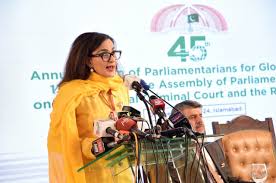Sherry emphasises PGA’s critical role in promoting global justice, strengthening democracy

Liaquat Ali
Islamabad: Senator Sherry Rehman, President of Pakistan’s Group of Parliamentarians for Global Action (PGA), emphasized the critical role that the PGA has played over the past four decades, promoting global justice, strengthening democracy, and addressing development challenges.
She was addressing the 45th annual forum of PGA and the 13th Consultative Assembly of Parliamentarians.
In her address, she welcomed delegates from over 36 countries, lauding the collaborative efforts of Sardar Ayaz Sadiq, Speaker of the National Assembly, and Syed Naveed Qamar, President of PGA, for hosting this significant event in Pakistan.
Rehman praised Mónica Adame, Secretary-General of the PGA, for her team’s dedication in uniting parliamentarians from around the globe to champion the promotion of human rights and the rule of law.
“The current turbulence and polarized state of the world is not the one we dreamed of, nor one we should live in,” Senator Rehman began, noting that the multilateral order, established post-World War II to ensure global peace, is facing severe tests. “War crimes, genocide, and economic inequality have intensified, creating sharp divides and exclusionary pyramids of privilege, while climate change threatens the resources essential to our survival.”
Senator Rehman asserted that the rise in conflicts and impunity for war crimes, including the situations in Palestine and Kashmir, “undermine the legitimacy of the multilateral order and challenge the universal principles we should rely on to guide our global civilization.” She called for a renewed commitment to universal laws, especially climate justice and economic equality, stressing that “peace should not become a cliche.”
Reflecting on the mission of PGA, Rehman praised the organization’s legacy of fostering dialogue and collaboration among global leaders. “This forum promotes an environment of plurality, where diverse voices from across the world contribute to constructive debate,” she said, emphasizing the need for leaders to bridge divides between national and international stakeholders, including parliamentarians and civil society.
Rehman also spoke of the troubling increase in conflicts since World War II, stressing that “while war crimes persist and genocide is committed, international perpetrators continue to go unpunished.” She voiced deep concerns that these issues remain unresolved, further destabilizing global peace and security.
In her remarks, Senator Rehman also addressed the limitations of the International Criminal Court (ICC), stating that “despite its establishment to hold accountable those accused of war crimes and genocide, the ICC has struggled to gain universal acceptance due to concerns over impartiality and selective enforcement.” She underscored the need for global legal mechanisms that respect the territorial integrity of states while remaining independent of geopolitical influences.
Rehman further called for “a new global political discourse to tackle these issues,” noting that double standards and politicization must be eliminated for a genuinely universal system of accountability to take root. She urged delegates to share best practices and find ways to end impunity for international crimes through legislative and political initiatives.
As the forum unfolds, Senator Rehman urged PGA members to share their perspectives and priorities, fostering a shared vision for addressing pressing global issues. “We are gathered here not only to discuss and debate but to make a resounding call to action,” she affirmed, highlighting the need for PGA members to leverage their legislative and political platforms to counter impunity and reinforce the multilateral framework.
Senator Rehman concluded by expressing her honour at being unanimously elected as President of Pakistan’s National Group of PGA. “I look forward to working with all of you to advance justice and promote the rule of law for a more just and equitable world,” she said, committing to promoting the principles of justice and accountability.





